Author Archives: Tereza Ma
USCCB Statement on the Inauguration of Joseph R. Biden, Jr., as 46th President of the United States of America
By Most Reverend José H. Gomez
LOS ANGELES – My prayers are with our new President and his family today.
I am praying that God grant him wisdom and courage to lead this great nation and that God help him to meet the tests of these times, to heal the wounds caused by this pandemic, to ease our intense political and cultural divisions, and to bring people together with renewed dedication to America’s founding purposes, to be one nation under God committed to liberty and equality for all.
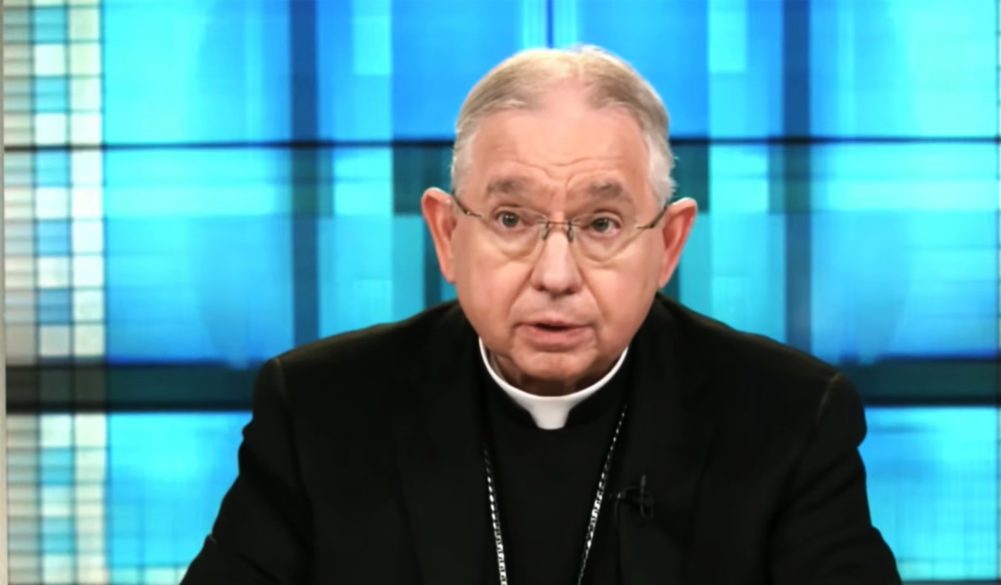
Catholic bishops are not partisan players in our nation’s politics. We are pastors responsible for the souls of millions of Americans and we are advocates for the needs of all our neighbors. In every community across the country, Catholic parishes, schools, hospitals, and ministries form an essential culture of compassion and care, serving women, children, and the elderly, the poor and sick, the imprisoned, the migrant, and the marginalized, no matter what their race or religion.
When we speak on issues in American public life, we try to guide consciences, and we offer principles. These principles are rooted in the Gospel of Jesus Christ and the social teachings of his Church. Jesus Christ revealed God’s plan of love for creation and revealed the truth about the human person, who is created in God’s image, endowed with God-given dignity, rights and responsibilities, and called to a transcendent destiny.
Based on these truths, which are reflected in the Declaration of Independence and Bill of Rights, the bishops and Catholic faithful carry out Christ’s commandment to love God and love our neighbors by working for an America that protects human dignity, expands equality and opportunities for every person, and is open-hearted towards the suffering and weak.
For many years now, the United States Conference of Catholic Bishops has tried to help Catholics and others of good will in their reflections on political issues through a publication we call Forming Consciences for Faithful Citizenship. The most recent edition addresses a wide range of concerns. Among them: abortion, euthanasia, the death penalty, immigration, racism, poverty, care for the environment, criminal justice reform, economic development, and international peace.
On these and other issues, our duty to love and our moral principles lead us to prudential judgments and positions that do not align neatly with the political categories of left or right or the platforms of our two major political parties. We work with every President and every Congress. On some issues we find ourselves more on the side of Democrats, while on others we find ourselves standing with Republicans. Our priorities are never partisan. We are Catholics first, seeking only to follow Jesus Christ faithfully and to advance his vision for human fraternity and community.
I look forward to working with President Biden and his administration, and the new Congress. As with every administration, there will be areas where we agree and work closely together and areas where we will have principled disagreement and strong opposition.
Working with President Biden will be unique, however, as he is our first president in 60 years to profess the Catholic faith. In a time of growing and aggressive secularism in American culture, when religious believers face many challenges, it will be refreshing to engage with a President who clearly understands, in a deep and personal way, the importance of religious faith and institutions. Mr. Biden’s piety and personal story, his moving witness to how his faith has brought him solace in times of darkness and tragedy, his longstanding commitment to the Gospel’s priority for the poor — all of this I find hopeful and inspiring.
At the same time, as pastors, the nation’s bishops are given the duty of proclaiming the Gospel in all its truth and power, in season and out of season, even when that teaching is inconvenient or when the Gospel’s truths run contrary to the directions of the wider society and culture. So, I must point out that our new President has pledged to pursue certain policies that would advance moral evils and threaten human life and dignity, most seriously in the areas of abortion, contraception, marriage, and gender. Of deep concern is the liberty of the church and the freedom of believers to live according to their consciences.
Our commitments on issues of human sexuality and the family, as with our commitments in every other area — such as abolishing the death penalty or seeking a health care system and economy that truly serves the human person — are guided by Christ’s great commandment to love and to stand in solidarity with our brothers and sisters, especially the most vulnerable.
For the nation’s bishops, the continued injustice of abortion remains the “preeminent priority.” Preeminent does not mean “only.” We have deep concerns about many threats to human life and dignity in our society. But as Pope Francis teaches, we cannot stay silent when nearly a million unborn lives are being cast aside in our country year after year through abortion.
Abortion is a direct attack on life that also wounds the woman and undermines the family. It is not only a private matter, it raises troubling and fundamental questions of fraternity, solidarity, and inclusion in the human community. It is also a matter of social justice. We cannot ignore the reality that abortion rates are much higher among the poor and minorities, and that the procedure is regularly used to eliminate children who would be born with disabilities.
Rather than impose further expansions of abortion and contraception, as he has promised, I am hopeful that the new President and his administration will work with the church and others of good will. My hope is that we can begin a dialogue to address the complicated cultural and economic factors that are driving abortion and discouraging families. My hope, too, is that we can work together to finally put in place a coherent family policy in this country, one that acknowledges the crucial importance of strong marriages and parenting to the well-being of children and the stability of communities. If the President, with full respect for the church’s religious freedom, were to engage in this conversation, it would go a long way toward restoring the civil balance and healing our country’s needs.
President Biden’s call for national healing and unity is welcome on all levels. It is urgently needed as we confront the trauma in our country caused by the coronavirus pandemic and the social isolation that has only worsened the intense and long-simmering divisions among our fellow citizens.
As believers, we understand that healing is a gift that we can only receive from the hand of God. We know, too, that real reconciliation requires patient listening to those who disagree with us and a willingness to forgive and move beyond desires for reprisal. Christian love calls us to love our enemies and bless those who oppose us, and to treat others with the same compassion that we want for ourselves.
We are all under the watchful eye of God, who alone knows and can judge the intentions of our hearts. I pray that God will give our new President, and all of us, the grace to seek the common good with all sincerity.
I entrust all our hopes and anxieties in this new moment to the tender heart of the Blessed Virgin Mary, the mother of Christ and the patroness of this exceptional nation. May she guide us in the ways of peace and obtain for us wisdom and the grace of a true patriotism and love of country.
(Archbishop José H. Gomez is the Archbishop of Los Angeles and President of the United States Conference of Catholic Bishops. He released this statement on Jan. 20 through the USCCB.)
New Vicksburg Early Learning Center announces director
By Stephanie Brown
JACKSON – On Dec. 17, 2020, Vicksburg Catholic School announced that Katie Emfinger would take the reigns as the new director for the Sisters of Mercy Early Learning Center, set to open in late spring. Emfinger currently serves as the Title I and Resource Teacher at St. Francis Xavier, the Elementary Campus of Vicksburg Catholic School. She comes with a wealth of knowledge and experience that will be invaluable as the community welcomes its youngest learners.
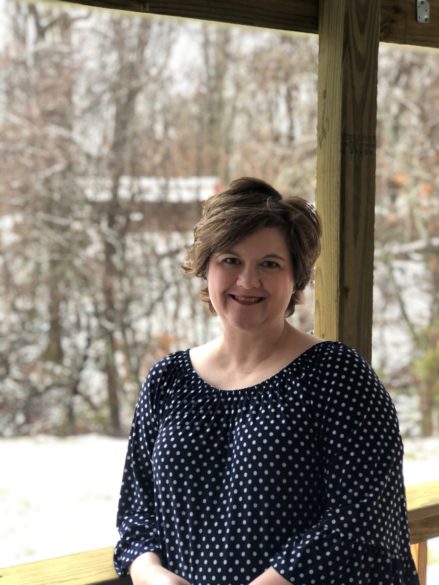
Emfinger received her B.S. in Elementary Education from Belhaven University and her M.Ed. from Mississippi College. In 2010, she received her National Board Certification. While the early learning center will be a part of the Vicksburg Catholic School umbrella, assuming the role of director brings on the responsibility and exciting opportunity to build organizational culture from the ground up. Starting with a brand-new facility and staff, Emfinger will build on the strong Catholic environment found in VCS while also making the center its own unique entity. When asked what she is most looking forward to in her new position, she said, “I am looking forward to creating a loving, enriching environment, along with my team at the Sisters of Mercy Early Learning Center, for all children.”
Having been a member of the Vicksburg Catholic family for five years, Emfinger recognizes the value of educating the whole child. Her strong academic background, combined with her desire to teach in the Light of Christ, will surely create an environment where all children can thrive.
Emfinger recognizes the importance of building a true sense of community in the new facility and hopes to create a place where children grow and parents are confident in the care the center provides. “I am also looking forward to not only watching our children grow physically, but watching them grow spiritually, intellectually, socially, and emotionally as well. I want our children to leave every day knowing they are loved.”
St. Francis Xavier Principal Mary Arledge said, “When working in a school with loving and caring teachers and staff as we have at St. Francis Xavier, you become more of a family than coworkers. Katie has been part of the family for five years, and she is everything that an Early Learning Center needs for a director. She is a warm, loving, gentle, and caring person who makes a perfect fit when caring not only for infants through 3-year-olds but also for the new mothers who may leave their child for the first time. Katie is dedicated to the field of education and excited to begin educating the youngest learners of Vicksburg Catholic School.”
(Stephanie Brown is the assistant superintendent of the Office of Catholic Education for the Diocese of Jackson.)
The Diaconate – Are you called?
By Deacon John McGregor
JACKSON – Have you ever thought or felt that God was calling you to greater service in the Catholic Church? Are you drawn to know more about your Catholic faith and to enter more deeply into a life of prayer and intimacy with Christ? If so, these could be indications that you are being called to the Permanent Diaconate. The Permanent Diaconate, restored by a Motu Proprio following Vatican II, is a ministry of service that is open to married and single men. In the words of St. Pope John Paul II, the deacon’s ministry “is the church’s service sacramentalized.”
Deacons are ordained to the Ministry of Service in three areas: word, sacrament and charity. As a servant to the word, deacons proclaim the Gospel, instruct the faithful and evangelize by word and deed, as did the great deacons St. Stephen and St. Francis. As a servant of the sacramental life of the church, deacons preside at baptisms, assist at the Eucharist, bring the Eucharist to the sick and suffering, witness marriages, bury the dead, and preside at Benediction. As a servant of charity, like the great deacon St. Lawrence, deacons report the needs of the community to the church and bring support and assistance to those in need. The deacon is called to be the “Icon of Christ the Servant” living out the life of charity for the people of God and inviting everyone to help feed the hungry, visit the sick and care for one another in our brokenness.
Because deacons have secular jobs and many are married with families, they are familiar with the daily stresses of life. By living and working in the secular world, the deacon seeks to model, in his person, the integration of what one believes and how one lives.
If you think you may be called to the permanent diaconate, the Diocese of Jackson is offering a series of five inquiry meetings via Zoom. Below are the dates and the topic for each of the inquiry meetings.
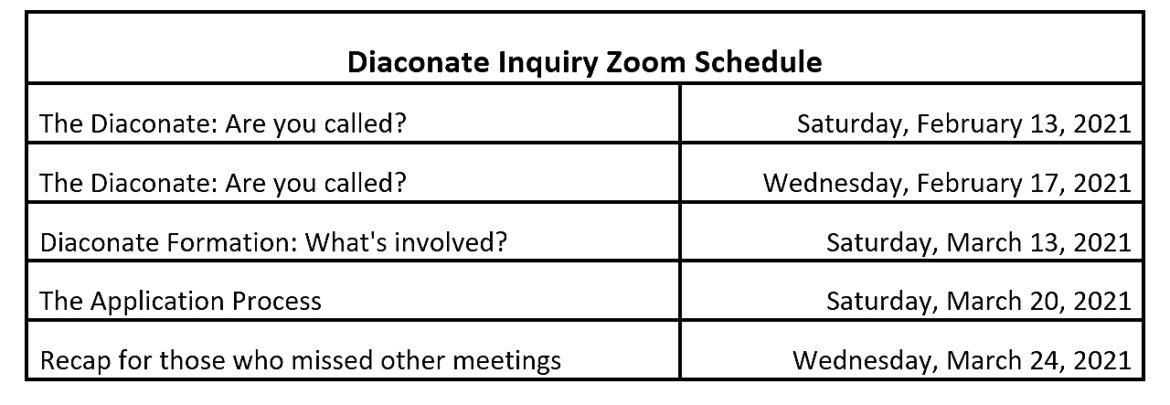
For Zoom meeting invitations and additional information, please contact:
Deacon John McGregor, D.Min.
Director of the Permanent Diaconate
john.mcgregor@jacksondiocese.org
Inmersión total como hijos amados de Dios
Por Obispo Joseph R. Kopacz, D.D.
Al salir de la temporada navideña, esperamos y oramos para que fuéramos bendecidos en el espíritu, al saber que nuestra fe en el Hijo de Dios “conquista el mundo”, tal y como proclamamos en las Escrituras durante la fiesta del Bautismo del Señor.
Esta metanoia, cambio profundo del corazón, es mucho más que todas y cada una de las resoluciones de año nuevo que con demasiada frecuencia se pliegan y arrugan como papel de regalo desechado. Más bien, es una perspectiva renovada viva en el Espíritu de Dios que se cierne, iluminando nuestras mentes, corazones e imaginaciones, al saber que somos hijos de Dios, amados de una manera que sobrepasa todo entendimiento.
En esa primera noche de Navidad, los cielos se abrieron con el coro de ángeles cantando: “Gloria a Dios en las alturas”. Años más tarde los cielos fueron rotos en pedazos, en el Bautismo en el río Jordán, por la voz del Dios de la gloria eterna revelando que este Jesús de Nazaret es el Cristo de la historia y el Hijo amado del Padre, el Verbo hecho carne. “Éste es mi Hijo amado, a quien he elegido.”

En esta época de furiosa pandemia, espantosas luchas civiles y violencia, rencor y división aparentemente intratables, ¿adónde encontramos la luz y el poder para vivir una vida digna de nuestro llamado como hijos de Dios?
No busque más que el Prólogo del Evangelio de San Juan, una proclamación del día de Navidad, que resplandece de esperanza en el amado Hijo de Dios, la Palabra eterna para nuestros tiempos inestables y perturbadores. “En el principio ya existía la Palabra; y aquel que es la Palabra estaba con Dios y era Dios. Él estaba en el principio con Dios. Por medio de él, Dios hizo todas las cosas; nada de lo que existe fue hecho sin él. En él estaba la vida, y la vida era la luz de la humanidad. Esta luz brilla en las tinieblas, y las tinieblas no han podido apagarla.” Juan 1:1-5
Incluso ahora, la oscuridad no ha vencido esta vida y luz divinas. Desafortunadamente, esta visión para nuestras vidas puede perderse fácilmente en el asalto de las sombras, la oscuridad y la muerte.
Sin embargo, la temporada navideña fue una celebración de la luz que brilla en la oscuridad, invitándonos a renovar nuestra visión para ver que Dios está con nosotros, Emmanuel. La Encarnación nos eleva a las puertas del cielo, y el Bautismo del Señor habla de la total inmersión de Dios en todas las cosas humanas, dejando a un lado su gloria, humildemente se une a nosotros en nuestra pecaminosidad. Nos corresponde apreciar el don de la fe, como la Santísima Madre, en la forma en la que ella abrazó al niño Jesús, reflexionando sobre lo que este tesoro significa para nuestras vidas.
El misterio de nuestra fe, que conquista el mundo, nos revela que la madera del pesebre nunca se separa de la madera de la Cruz. El bautismo de Jesús en el Jordán es inseparable de la crucifixión; su inmersión en agua anticipa su inmolación en la Cruz. Cuando tomamos estas cosas en serio, nos damos cuenta de que todo el Nuevo Testamento fue escrito después de la crucifixión y resurrección del Señor a través de la sombra del Espíritu Santo.
Entonces, ¿cómo nos une nuestro bautismo al amado Hijo de Dios, la Luz que brilla en las tinieblas?
Un pasaje que a menudo se selecciona de la carta de San Pablo a los Romanos para la celebración del sacramento del Bautismo y en muchas liturgias funerarias revela el misterio. “¿No saben ustedes que, al quedar unidos a Cristo Jesús en el bautismo, quedamos unidos a su muerte? Pues por el bautismo fuimos sepultados con Cristo, y morimos para ser resucitados y vivir una vida nueva, así como Cristo fue resucitado por el glorioso poder del Padre. Si nos hemos unido a Cristo en una muerte como la suya, también nos uniremos a él en su resurrección. Sabemos que lo que antes éramos fue crucificado con Cristo, para que el poder de nuestra naturaleza pecadora quedara destruido y ya no siguiéramos siendo esclavos del pecado.” (Romanos 6:3-6)
El perdón de los pecados, el crecimiento en el Señor, dejar de ser esclavos del pecado, del temor, de la desesperanza y la novedad de vida son señales esenciales de que estamos viviendo una vida digna de nuestro llamado. Es una conciencia humilde inspirada por el Espíritu Santo, purificada por aguas santificadas y la sangre derramada en la Cruz, de que en última instancia pertenecemos a Dios.
Somos hijos e hijas amados de Dios, injertados en la vid viva, el Cuerpo de Cristo, la Iglesia. El amor de Cristo nos impulsa a vivir nuestro bautismo, nuestra vocación, nuestro discipulado, creciendo en el poder de la fe para saber que somos hijos amados de Dios, inmersos de lleno en este mundo, comprometidos con una mayor justicia y paz para todos y siempre dejando un espacio a la vida eterna que revolotea cerca de nuestras preocupaciones y decisiones diarias.
In new year, share the blessing of your time
By Cindy Wooden
VATICAN CITY (CNS) – At the beginning of a year people hope will mark the end of the COVID-19 pandemic, Pope Francis urged them to create a “culture of care,” including by sharing the gift of their time with others.
Despite suffering from a bout of sciatica, nerve pain, that left him unable to preside over Mass Jan. 1 in St. Peter’s Basilica, the pope sent a homily focused on God’s blessings and on sharing those blessings with others.
Consecrating the new year to Mary, the pope prayed that she would “care for us, bless our time, and teach us to find time for God and for others.”
Cardinal Pietro Parolin, Vatican secretary of state, read the pope’s homily as he celebrated the Mass for the feast of Mary, Mother of God, and for the Catholic Church’s celebration of World Peace Day.
Only about 100 people, all wearing masks, were in the socially distanced congregation for the Mass at the Altar of the Chair in St. Peter’s Basilica. Two dozen cardinals, also wearing masks, concelebrated.
In the homily he wrote, Pope Francis returned to themes from his World Peace Day message – “A Culture of Care as a Path to Peace” – and a recent general audience talk about prayers of blessing.
“This year, while we hope for new beginnings and new cures, let us not neglect care,” the pope wrote. “Together with a vaccine for our bodies, we need a vaccine for our hearts. That vaccine is care. This will be a good year if we take care of others, as Our Lady does with us.”
“The Lord knows how much we need to be blessed,” the pope wrote. “The first thing he did after creating the world was to say that everything was good and to say of us that that we were very good.”
But with the birth of Jesus, he said, “we receive not only words of blessing, but the blessing itself: Jesus is himself the blessing of the Father.”
“Every time we open our hearts to Jesus, God’s blessing enters our lives,” he said.
The example of Mary, blessed in a special way, he wrote, “teaches us that blessings are received in order to be given.”
Referring to the Latin roots of the word “benediction” – to speak well – Pope Francis wrote that “we, too, are called to bless, to ‘speak well’ in God’s name.”
“Our world is gravely polluted by the way we speak and think badly of others, of society, of ourselves,” he said. But complaining and denigrating others “corrupts and decays, whereas blessing restores life and gives the strength needed to begin anew.”
The blessing of Jesus’ birth, he wrote, is all the more amazing because God sent the savior into the world as a baby, who was formed in the flesh within the womb of Mary.
“The heart of the Lord began to beat within Mary; the God of life drew oxygen from her,” the pope wrote. “Through Mary, we encounter God the way he wants us to: in tender love, in intimacy, in the flesh.”
As 2021 begins, he said, people should make a commitment to finding time for others.
“Time is a treasure that all of us possess, yet we guard it jealously, since we want to use it only for ourselves,” he wrote. “Let us ask for the grace to find time for God and for our neighbor – for those who are alone or suffering, for those who need someone to listen and show concern for them.”
(Follow Arocho on Twitter: @arochoju)
Faithfulness goes the distance
Reflections on Life
By Melvin Arrington
What comes to mind when you hear words like faithful, loyal, dedicated and committed? Most would probably think of some couple whose marriage has lasted sixty or seventy years. You might also give the example of someone who continues to work for the same organization for decades, despite more lucrative offers from other companies. Maybe you would consider an activist who has remained steadfast in support of a cause, even to the point of being jailed rather than compromise his beliefs. And let’s not forget those whose devotion to God is so strong that they seem to be involved in practically every ministry in their parish.
But the best example, the model we should all strive to emulate, is not related to human fidelity but rather to God’s. All throughout the Old Testament we find covenants the Lord made with His chosen people. And in every single case He kept His commitment, even though the Israelites failed to keep theirs. In fact, much of the Old Testament landscape is littered with these broken covenants and all sorts of other transgressions.
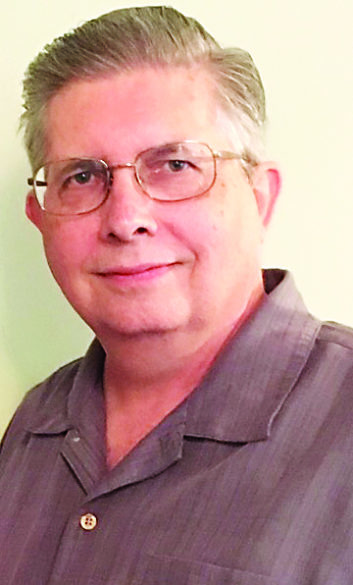
Scott Hahn, in his book A Father Who Keeps His Promises: God’s Covenant Love in Scripture, examines in detail the covenants God made with Adam, Noah, Abraham, Moses and David, and the specific signs that accompanied each of them, namely – the Sabbath, the rainbow, circumcision, the Passover, and the everlasting throne, respectively. Hahn then demonstrates how the Lord fulfilled all those promises and brought them to fruition in Jesus, the New Covenant, under the sign of the Eucharist. Throughout the ages God has kept his commitments to His people. He is always faithful, even when we’re not.
Faithfulness, the seventh of the nine Fruits of the Spirit in Galatians 5:22-23, is an expression of love, a love that demands fidelity, loyalty and commitment. The latter quality is especially tricky, and it can become a sticking point because it’s usually easy to make a commitment but often much more problematic to follow through on it. St. Camillus (d. 1614) got to the heart of the matter when he observed: “Commitment is doing what you said you would do when the feeling you had when you said it has passed.”
As Christians we are called to keep our commitments to the poor, the sick, the immigrant, the outcast, the forgotten. But just saying that we love our neighbor is not enough. We are responsible for putting our faith into practice; we’ve got to move; we’ve got to act. Our calling is to be a beacon of hope to those in need. And the way we demonstrate that we care is by going out into our communities and ministering to our brothers and sisters with love and compassion. That’s what it means to be faithful. While it’s true that our efforts may not always produce positive results, we should take encouragement from these words of St. Teresa of Calcutta: “God does not ask us to be successful but to be faithful.”
So, have I been true to my calling? How am I doing with regard to my faithfulness? Well, to be honest, the answers would have to be “not always” and “from time to time not so good.” There have been occasions when I didn’t pray for someone who needed my prayers, instances when I made excuses for not calling, visiting, or writing someone who was ill or lonely and, sadly, moments when I refused to offer assistance to a person who was looking to me for a helping hand. In other words, I just flat out failed. But despite these failures, my neighbor is still out there, and he’s still counting on me.
Past shortcomings should never be used as an excuse for missing out on new service opportunities that come along every day. At some point we will surely fall, but when that happens our only option will be to pick ourselves up, dust ourselves off, and get back to doing the work we’ve been called to do. After all, life is not a sprint. It’s a marathon, and we’ve all got to persevere if we’re going to go the distance on the spiritual path.
So, every morning, shortly after waking up, I try to remember to offer a little prayer asking the Lord to remind me of my responsibilities as a Christian, reveal to me specific service opportunities for the day, and also help me muster the energy to perform those tasks to the best of my ability. And when my strength begins to wane, I know God will come to my aid because, as I Thessalonians 5:24 says: “the one who calls you is faithful.” Heavenly Father, help me to always be faithful, too. Help me to be the “good and faithful servant” you want me to be, through Christ Our Lord. Amen.
(Melvin Arrington is a Professor Emeritus of Modern Languages for the University of Mississippi and a member of St. John Oxford.)
Priest’s new book offered as guide for reflection, preparation during season of Lent
By Terry Dickson
BAY ST. LOUIS – Father Sebastian Myladiyil, SVD, has written a new book that will serve as an excellent resource for daily reflection during Lent as Catholics prepare for Easter celebrations.
His Instruments: If God Could Use Them…He Can Use Us (Vol. 2) is available through Daphne, Ala. – based publisher River Birch Press. The first volume, which focuses on characters of the Old Testament, was published in 2012. Father Sebastian’s new book profiles 40 characters from the New Testament. The book’s foreword was written by Bishop Joseph R. Kopacz.
“The basic premise of this book is that, if you see a good person, you imitate that person, that person’s values and virtues. If you see a person of questionable character or a bad person, you examine your conscience,” said Father Sebastian during a recent visit to St. Augustine Seminary in Bay St. Louis.
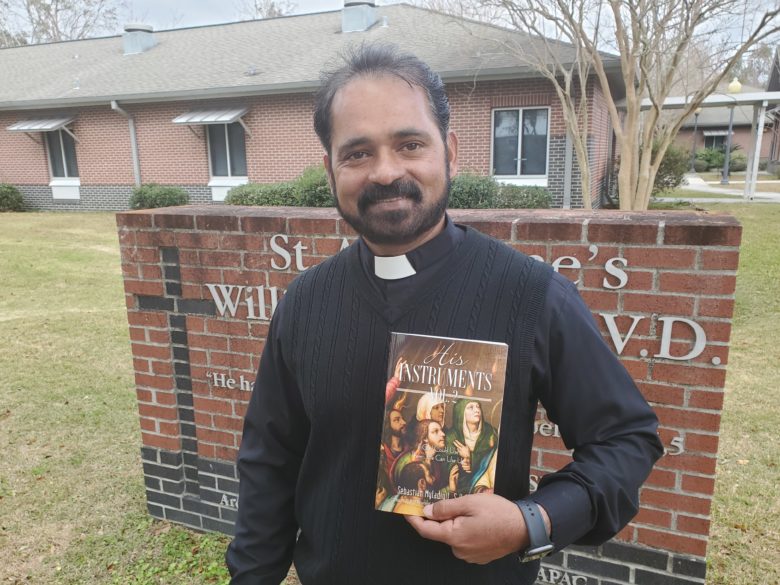
“In the Bible, we have so many wonderful men and women of faith whose lives and choices we can certainly relate to for ourselves. At the same time, in the Bible, we also have the questionable characters. Many of them responded to God’s call with great enthusiasm, initially, but when challenges and difficulties came, their enthusiasm diminished and they were attracted to other things. As a result, they fell away from God’s plans and their lives became failures.”
Father Sebastian, current pastor of Sacred Heart Greenville, said each of the characters in his newest book – both good and bad – have valuable lessons to impart.
“Their situations are no different than ours,” he said. “The historical context might be a little different, but the human emotions are the same and how we deal with the uncertainties of life, how we deal with unexpected tragedies in life. Those are all the same.
“The important thing is to see God always, and to have the steadfast conviction in our hearts that God is there always and to receive that strength from Him.”
Father Sebastian begins the book by examining the lives of the main characters from the Infancy Narrative – Zechariah, Elizabeth, John the Baptist, Joseph and Mary.
“I also look at the public life of Jesus where some of the prominent apostles come along, such as Peter, Andrew, John, Thomas and Matthew,” he said. “I look at the parables of Jesus Christ where some of those beautiful characters evolve, such as the Good Samaritan, the Rich Man and Lazarus. I also profile characters such as Nicodemus and the Samaritan Woman, Martha and Mary and Lazarus. I look at the Acts of the Apostles and the writings of Paul. We have Stephen the Martyr and Saul of Tarsus, who becomes Paul of Tarsus.”
Father Sebastian is a native of India and a naturalized U.S. citizen. He is a Divine Word Missionary priest, serving the Southern Province of USA since 1999, and has been serving in different parishes that are comprised of multi-cultural populations such as African-Americans, Caucasians and Hispanics. Along with his pastoral duties, he obtained his first Master’s Degree in Moral Theology from Notre Dame Seminary in New Orleans, and a second Master’s Degree in Educational Leadership and Counselling from Lamar University in Beaumont, Texas. Currently, he is serving at Sacred Heart Greenville; St. Francis Church in Shaw; and Sacred Heart Church in Rosedale.
To date, Father Sebastian has four books published: His Instruments; His Instruments – If God Could Use Them He Can Use Us; and Blown Together – The Trials and Miracles of Katrina. His fourth book is a translation of His Instruments into Spanish: Sus Instrumentos. Currently, he is working on his next book, A Compendium of Prayers – Why We Pray.
His Instruments – If God Could Use Them He Can Use Us is available on Amazon for $20 plus shipping; the Kindle edition is available for $9.99. For more information, contact Father Sebastian at sebymy@hotmail.com or call 228.324.4927.
(Terry Dickson is the editor of Gulf Pine Catholic and the director of communication for the Diocese of Biloxi.)
In memorium: Rev. James J. Pillar, O.M.I. and Sister Virginia Delaney
TEWKSBURY, Mass. – Rev. James J. Pillar, O.M.I., 92, died on Dec. 19, 2020 at the Immaculate Heart of Mary Residence, Tewksbury, Massachusetts. He was born in St. Paul, Minnesota and was a son of the late Jerome H. and Gertrude D. (Swifta) Pillar. He was preceded in death by his brothers, Donald and Gerald.
Father Pillar began studies for the Catholic priesthood in 1942 at Oblate Seminaries, St. Henry’s, Belleville, Illinois and at Our Lady of the Ozarks, Carthage, Missouri. He professed his first vows on Aug. 15, 1949 and was ordained to the priesthood at St. Paul Cathedral, Minnesota on June 5, 1954. He earned his Theology and Philosophy degrees at Catholic University of America in Washington, D.C. He studied English Literature at Ottawa University in Canada.
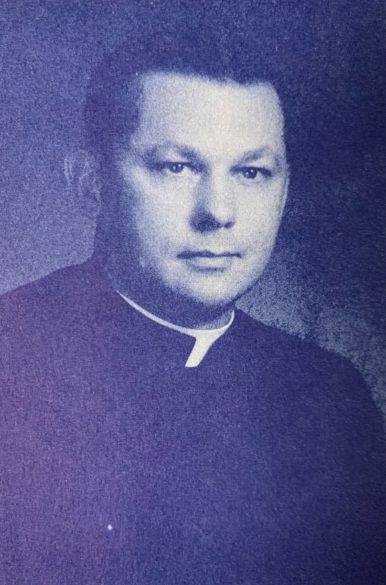
Much of Father Pillar’s life was spent in the classroom teaching at the Oblate seminary in Pass Christian, Mississippi and twenty-seven years at Loyola University in New Orleans. In 2012, a Distinguished Professorship in History was established in his name at Loyola University. It was subsequently renamed the A.D.G. Distinguished Professorship in history, highlighting his close association with Alpha Delta Gamma Fraternity.
A published American church historian, he earned his PhD in Ecclesiology at Pontifical Gregorian University in Rome. He retired from teaching in 1992 and did parish work in Colorado Springs. He enjoyed camping in the Rocky Mountains and serving as a cruise ship chaplain.
Upon retirement in 2004, he was a resident of Oak Meadows Senior Living in Oakdale, Minnesota. In 2017 he transferred to the Immaculate Heart of Mary Residence in Tewksbury, Massachusetts, where he remained until his death. In addition to his Oblate family, he is survived by many relatives and friends.
Due to the COVID-19 pandemic, funeral services will be private. Father Pillar will be buried at Saint Joseph Cemetery, East Chelmsford, Massachusetts.
Donations in memory of Father Pillar may be made to the Oblate Infirmary Fund, 486 Chandler Street, Tewksbury, MA 01876-2849.
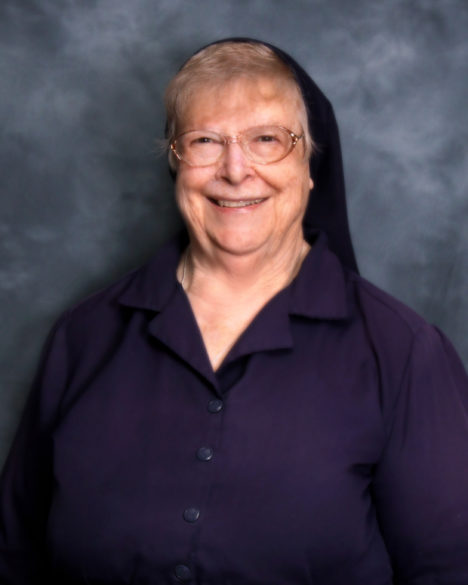
ST. LOUIS – Sister Virginia (Virginia Katherine) Delaney, D.C., died on Dec. 28, 2020 at Seton Residence in Evansville, Indiana. Sister Virginia was born on Sept. 4, 1931 in Natchez, Mississippi, and was one of four children of Marcus James and Mary Katherine (Gilbert) Delaney. She graduated from St. Joseph Catholic High School (Cathedral School) in Natchez, in 1949 and entered the Daughters of Charity in St. Louis, Missouri, the same year.
After initial formation and earning a B.S. degree in Nursing from Marillac College in St. Louis (1961), Sister Virginia served in health ministry as a Nurse Supervisor at Providence Hospital in Mobile and St. Paul Hospital in Dallas. She received an M.S. degree in Public Health Nursing from Wayne State University in Detroit, Michigan (1968) and an M.A. degree in Theological Studies from Springhill College in Jackson, (1988). Sister was a Public Health Nurse at St. Vincent Hospital in Birmingham; Charity Hospital in New Orleans; St. Mary’s Medical Center in Saginaw, Michigan; and for the County Health Department in Selma, Alabama. She also served as a nurse at Marillac Social Center in Chicago and as a teacher at Loyola University in Chicago and Alcorn State University in Natchez, (1985-1988). In 1988, Sister Virginia began her ministry in Mission Integration at St. Vincent Hospital in Birmingham, and as Director of Mission Services at the former Mater Dei Provincialate until she moved to Seton Residence to serve in the Ministry of Prayer.
Sister Virginia was buried in St. Joseph Cemetery in Evansville, Indiana, and a memorial Mass will take place at a later date. Sister was preceded in death by her parents; her sister, Merle McLain; and her brother, Leo Delaney. She is survived by her sister Mary Gunning; nieces and nephews; her Sisters in community; and many friends.
Donations may be made to the Daughters of Charity, 4330 Olive Street, St. Louis, MO 63108.
Featured photo Mississippi Snow Day …
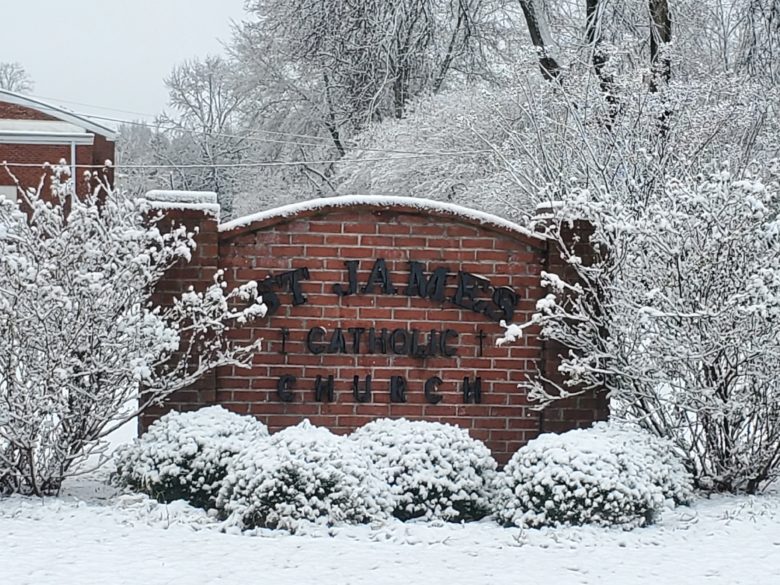
LELAND – St. James Catholic Church in Leland was covered in snow on Monday, Jan. 11. Mississippi Catholic would like to publish snow day photos of our parishes and schools in our next edition and online, if you have a photo you would like to submit for possible publication, please send to editor@jacksondiocese.org by Jan. 20. (Photo by Deborah Ruggeri)
